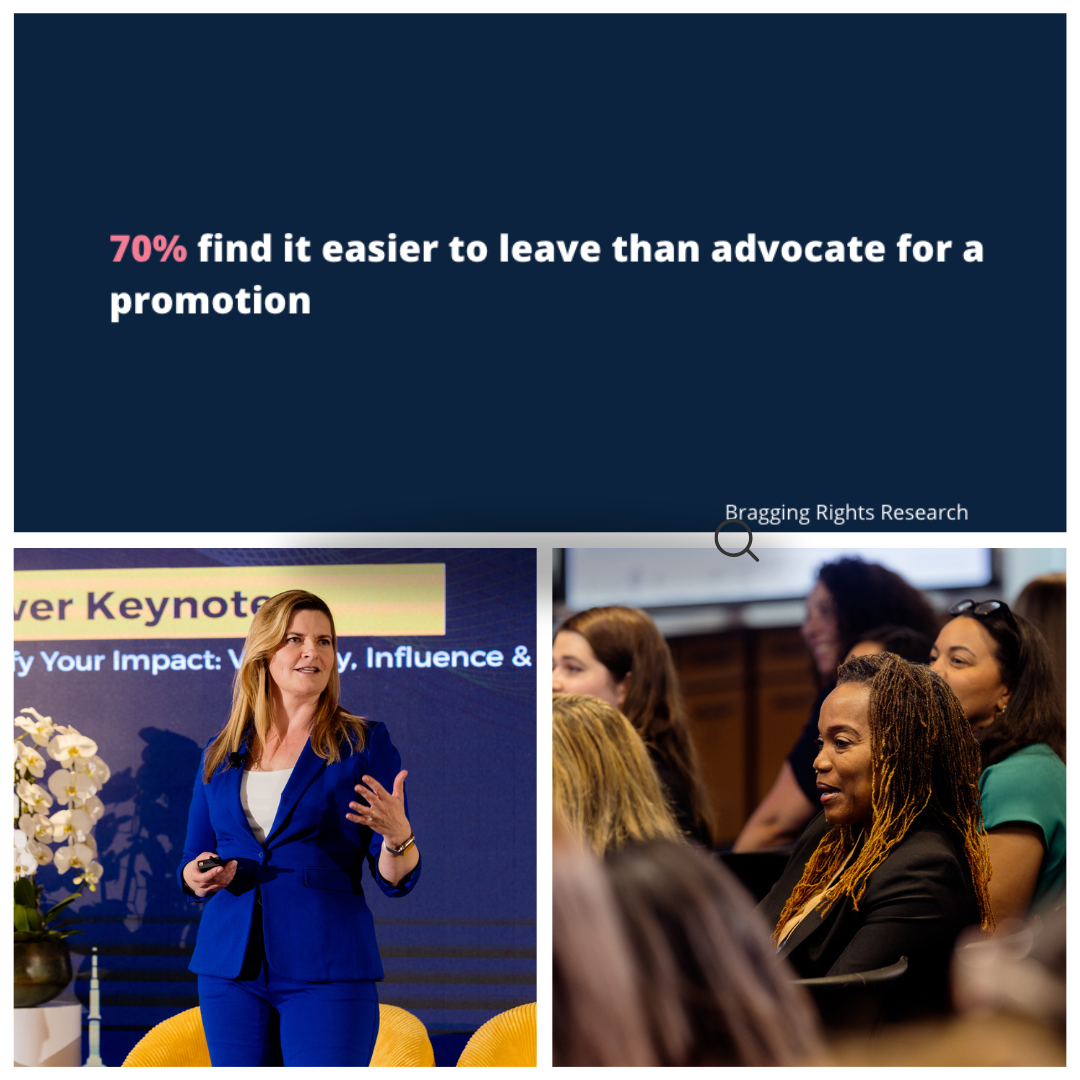Why People Leave Instead of Speaking Up

What your top performers aren’t saying—and why it matters
One of the most revealing findings from my international research on self-promotion and bragging was this:
70% of professionals said they find it easier to leave their job than to self-promote inside their organization.
Let that settle in.
These are not disengaged, unskilled, or underperforming people. These are high-achieving, thoughtful, creative professionals. The kind you fight to recruit and struggle to retain.
But when faced with a choice between speaking up about their success or updating their LinkedIn and walking out, they choose the exit.
This insight came up again during my keynote at the Women in AI North America Summit and Awards, hosted at Deloitte. In a room of over 300 brilliant professionals, I shared the data and I could feel the recognition. The quiet nods. The knowing glances. The visceral truth of it.
This is not just anecdotal. It is an unspoken norm that plays out across industries, roles, and leadership levels.
The Culture Cost of Silence
We often talk about self-promotion as a soft skill. Something optional. Personal. Stylistic.
But here is the real cost: when people do not feel safe or equipped to talk about their work, organizations lose visibility into the very contributions that could drive innovation, momentum, and strategic advantage.
This is not just about retention. It is about opportunity.
Ideas stay buried. Wins go unrecognized. Talent that could have transformed your next phase quietly exits without ever fully being seen.
When visibility is unsafe, performance becomes invisible. That is a risk you cannot afford.
Why They Don’t Speak Up
Here is what I have learned working with organizations and individuals around the world:
- They are afraid of the consequences of visibility
- They have internalized cultural, social, or generational programming that says it is not okay to talk about yourself
- They have seen others punished, directly or subtly, for bragging
- Perhaps most damaging of all, they believe their work should speak for itself
In the modern workplace, silence does not get you seen. Unseen work rarely gets rewarded.
You do not lose people because they lack ambition. You lose them because they cannot see a path to be seen.
The Case for Purposeful Bragging
This is why I wrote Bragging Rights. To reframe self-promotion not as ego, but as strategy.
Bragging, done right, is brave, generous, and deeply necessary. For individuals. For teams. For culture.
It is not about shouting. It is about making visible what matters.
Even if you are not in charge of culture, you can start shifting your own narrative. That is why I wrote the book.
What Organizations Can Do
If you want to keep your A-plus-plus people and unlock the value they bring, you have to build environments where visibility is not dangerous. Bragging must be seen as contribution, not liability. People need both permission and tools to speak about their success.
That is the work I am doing now through keynotes, training, and workshops designed to transform how teams and leaders talk about value.
You do not have to overhaul your culture to shift this. But you do need to name it and train for it.
This is culture work.
It is leadership work.
And it is long overdue.
Silent Talent FAQ
Why is "silent talent" a major risk for organizational retention?
When high-performers feel their work is invisible, they don't fight for recognition—they simply look for an exit. Our research shows that 70% of talent would rather leave than engage in traditional self-promotion. If a leadership culture doesn't provide a framework for strategic visibility, it effectively creates a "hidden gem" problem where the best people feel forced to move on to be seen.
How does invisible expertise contribute to the $9.6T global productivity gap?
The $9.6 trillion gap identified by Gallup is largely driven by a lack of engagement and the "knowledge leak" that happens when expertise isn't shared. When employees are afraid to "brag," their unique insights and wins stay siloed. This lack of transparency means leaders can't leverage the full power of their teams, leading to massive inefficiencies and missed market opportunities.
What can leaders do to change the culture of silence?
Leaders must move from "waiting to be told" to "creating the infrastructure for sharing." This means shifting the language from ego-driven "bragging" to Strategic Visibility. By implementing systems like a "Brag Book" or using the Brag Word Continuum, leaders can normalize the articulation of value, making it safe and necessary for talent to speak up.
Share this article with a leader in your network because uncovering hidden expertise is the fastest way to bridge the recognition gap and protect your organization's most valuable talent.
The book → Bragging Rights